I first visited Chang Chih-jen (章志仁) on an afternoon in July at a secure army hospital. Dressed in army green and wearing a pair of slippers, he lounged about his ward, reading a newspaper.
He knew he would soon leave the hospital -- the National Arm Forces Pei-tou Hospital (國軍北投醫院, also called 818 Hospital), a psychiatric facility for soldiers with mental illnesses. He had recently been told his discharge from compulsory military service had been approved on the grounds of his diagnosed illness -- clinical depression. He was simply waiting for the paperwork to come through and so felt at ease.
"It's like heaven here," said Chang's visiting friend, Wang. "You can read whatever books you want to read. You still get your military salary."
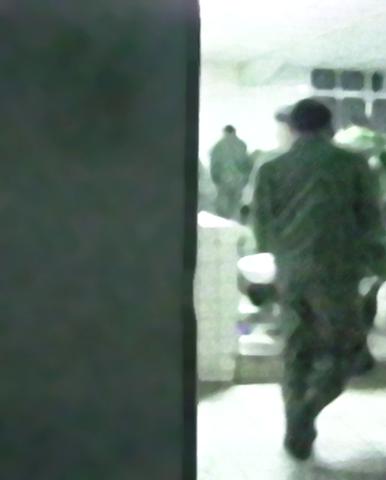
The only problem, he said, was "the medicine you take everyday makes you sleepy and sluggish. But once every two weeks you can go to see your girlfriend -- they call it `outpatient therapy.'"
Sitting beside Chang were his ward-mates Hsu Kuo-min and Lin Liang.
"I have schizophrenia. I once randomly fired my rifle toward the other side of the island," Hsu said.
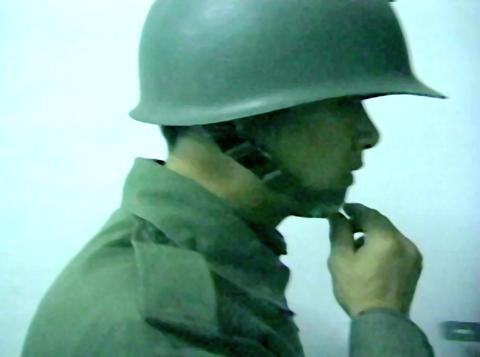
"I don't know what I have but I attempted to kill my commanding officer," Lin said.
"In this place it's not easy to tell true from false," Chang whispered.
A few moments later, Lin suddenly yelled at Hsu, fixating upon him with a fierce look. "Stand still! Hands pressed close to your sides! You slacker! Piece of junk! Hold your rifle properly!" Chang and his friend tried to comfort Lin and soon a nurse came to the ward and ushered the visitors out.
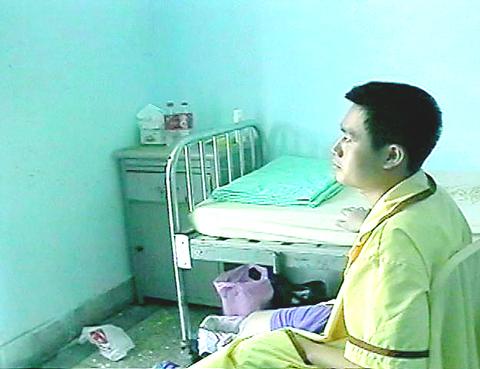
PHOTO: COURTESY OF YANG LI-CHOU
A CIVILIAN AGAIN
"I cannot say my condition was entirely faked, but there was some degree of manipulation," Chang said two months later, after he was discharged and had taken up a job at an Internet company. "When I realized that I really hated the army and my officers, I decided to go to see a psychiatrist," Chang said.
"I had a record of returning late after holidays," he said, adding that he said he had a fear of going back to the army and that he suffered from long-term insomnia. "But I exaggerated some of my symptoms, such as attempting suicide and auditory hallucinations," he said.
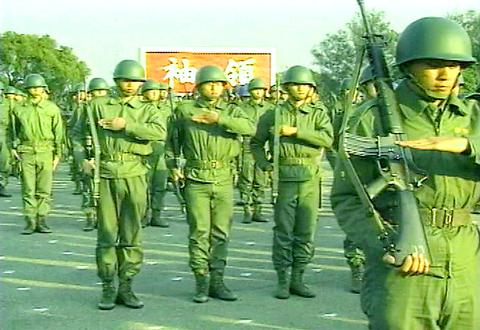
PHOTO: COURTESY OF YANG LI-CHOUN
People like Chang are being called a "new kind of draft-dodger" in Taiwan.
In the past, draft-dodgers might try to simulate or fake physical affliction to evade the country's two-year compulsory military service. Examples included putting on or losing significant weight, claims of substandard eyesight or even worsening cardiac diseases.
But now people have started to fake mental illness as a means of dodging military service. One of Chang's schoolmates pretended to suffer from gender identity disorder -- claiming he was a woman -- and thus escaped from the service.
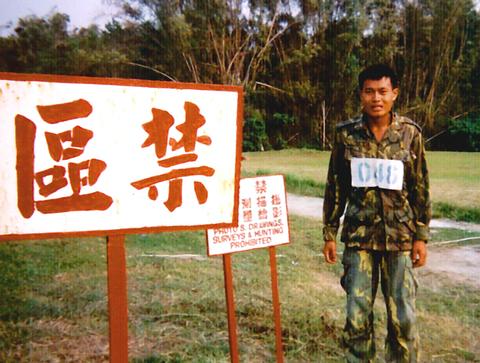
PHOTO: COURTESY OF YANG LI-CHOU
There are 10 mental illnesses that require a discharge from military service, according to the Ministry of National Defense -- among them neurosis, psychosis, personality disorders, psycho-sexual disorders and autism.To fake such illnesses isn't easy, so some young men actually seek advice from others who have tried it -- usually fellow classmates -- Chang and Wang said.
Student societies in colleges have even printed handbooks on faking illnesses, they said. "Take depression as an example, you should say you've lost interest in many things. You often feel sad. You become agitated easily. And gradually, you should say you have tried several attempts at suicide," Wang said.
According to Wang Chia-chun (

PHOTO: COURTESY OF YANG LI-CHOU
According to Chang and his friends, once you're sent to 818, a military discharge order is 80 percent assured.
ACTING BACKFIRES
But there are also mishaps. Cheng Li-ming was a faker who was less fortunate. He was originally a volunteer for three-year service, in order to earn money for his future overseas studies. One day, he returned to his base on an offshore island a week late. In order to avoid a court martial, he presented old medical records that stated he had seen psychiatrists for emotional problems before he went into the military. He was sent to 818 hospital and had to stay for almost a year before being discharged.
Because Cheng was diagnosed with schizophrenia, his admission to a US college was canceled. His three-year-service salary -- NT$35,000 per month -- was also cut down to a regular soldier's salary of around NT$25,000. He is now jobless. Cheng's story was later shot as a documentary titled I Love 080 (
It won three awards, in Japan, Switzerland and Taiwan.
"Who gives a damn about the NT$35,000 salary for three-year voluntary service? It is simply a waste of time in the military," said Chang, the former army recruit who now earns a starting salary of NT$40,000 a month at the Internet company.
MILITARY DENIES TREND
The military has brushed aside the possibility that mental patients could serve as soldiers in its ranks and the defense ministry would not release statistics on the number of men claiming to suffer from mental disorders.
However, a military doctor who requested anonymity said there had not been an increase in cases of mental disorders. He also stressed that mental disorders are not as easy to fake as people might think.
Wang, the 818 hospital official, agreed. He said patients claiming to have a mental order must undergo a thorough examination, including a series of tests with his family, that normally last for one to three months. This process often weeds out the fakers.
But interestingly, Wang also acknowledged that a recent push to downsize the military has resulted in "more flexibility" in judging mental disorder cases, most notably for those cases in the gray area.
The main reason for this is to avoid incidents or accidents that might hinder normal operations.
Psychiatrists from outside the military believe that some of the cases that may be perceived as fake -- especially those that disappear after discharge -- may in fact be born of the stress associated with the military environment.
Wang Hao-wei (
They have probably suffered from adjustment disorder and are thus considered borderline patients, he said.
Wang says the long-debated discipline problems in the military are part of the problem. In the past 10 years, there have been more than 15 manslaughter cases linked to the controversial disciplinary culture of the military. More than 20 people have died in those incidents.
COMPULSORY VerSus VOLUNTARY
Chien Hsi-chieh (
What Chang and many other young men have been hoping for is a change to a volunteer-based military.
Last year, this was debated -- with no concrete outcome -- in the Legislative Yuan and the Cabinet. Lee Yuan-tseh (
Taiwan now has 400,000 military men. Only 25 percent are volunteers. Every year, 140,000 young men (aged over 18) are drafted. Chien says this system, albeit to his disliking, is the best Taiwan can hope for in the short term.
Currently, the military is hoping to push forward with its downsizing program and is encouraging reluctant and redundant senior officers to retire.
But Chien says "the progress is extremely slow." Without a general reduction, it will be harder to offer higher salaries, which might in turn attract good volunteers and increase the professionalism of the military.
"On the whole, the move to voluntarism is still not feasible," Chien said. Another major obstacle, he said, is that military men's social status is still considered low.
"Even with a massive advertising campaign, the Ministry of National Defense finds it difficult to attract volunteer talent," Chien said. "If we adopt voluntarism in haste, our national defense could be weakened rapidly."
Editor's Note: In order to protect the identities of the former soldiers mentioned in this story, pseudonyms were used.

On April 26, The Lancet published a letter from two doctors at Taichung-based China Medical University Hospital (CMUH) warning that “Taiwan’s Health Care System is on the Brink of Collapse.” The authors said that “Years of policy inaction and mismanagement of resources have led to the National Health Insurance system operating under unsustainable conditions.” The pushback was immediate. Errors in the paper were quickly identified and publicized, to discredit the authors (the hospital apologized). CNA reported that CMUH said the letter described Taiwan in 2021 as having 62 nurses per 10,000 people, when the correct number was 78 nurses per 10,000

As we live longer, our risk of cognitive impairment is increasing. How can we delay the onset of symptoms? Do we have to give up every indulgence or can small changes make a difference? We asked neurologists for tips on how to keep our brains healthy for life. TAKE CARE OF YOUR HEALTH “All of the sensible things that apply to bodily health apply to brain health,” says Suzanne O’Sullivan, a consultant in neurology at the National Hospital for Neurology and Neurosurgery in London, and the author of The Age of Diagnosis. “When you’re 20, you can get away with absolute

May 5 to May 11 What started out as friction between Taiwanese students at Taichung First High School and a Japanese head cook escalated dramatically over the first two weeks of May 1927. It began on April 30 when the cook’s wife knew that lotus starch used in that night’s dinner had rat feces in it, but failed to inform staff until the meal was already prepared. The students believed that her silence was intentional, and filed a complaint. The school’s Japanese administrators sided with the cook’s family, dismissing the students as troublemakers and clamping down on their freedoms — with

As Donald Trump’s executive order in March led to the shuttering of Voice of America (VOA) — the global broadcaster whose roots date back to the fight against Nazi propaganda — he quickly attracted support from figures not used to aligning themselves with any US administration. Trump had ordered the US Agency for Global Media, the federal agency that funds VOA and other groups promoting independent journalism overseas, to be “eliminated to the maximum extent consistent with applicable law.” The decision suddenly halted programming in 49 languages to more than 425 million people. In Moscow, Margarita Simonyan, the hardline editor-in-chief of the